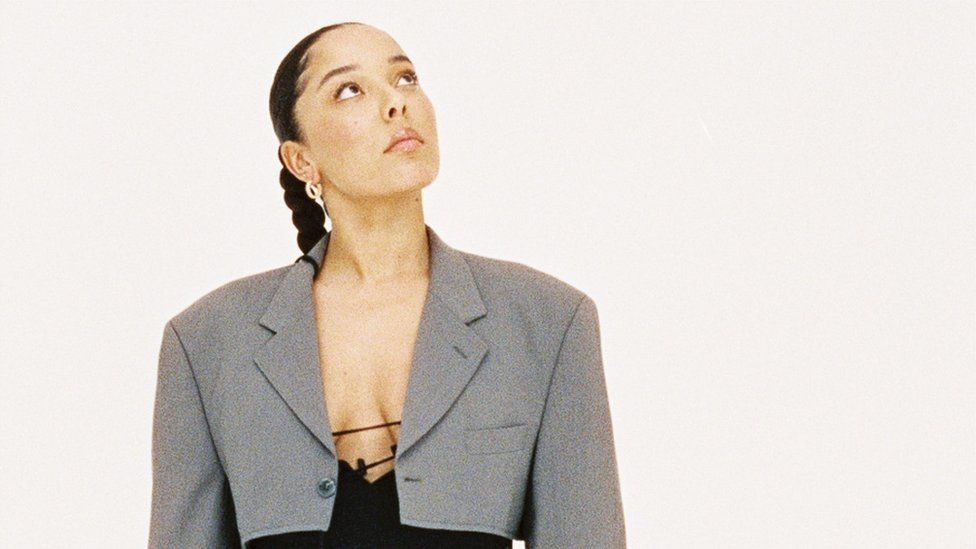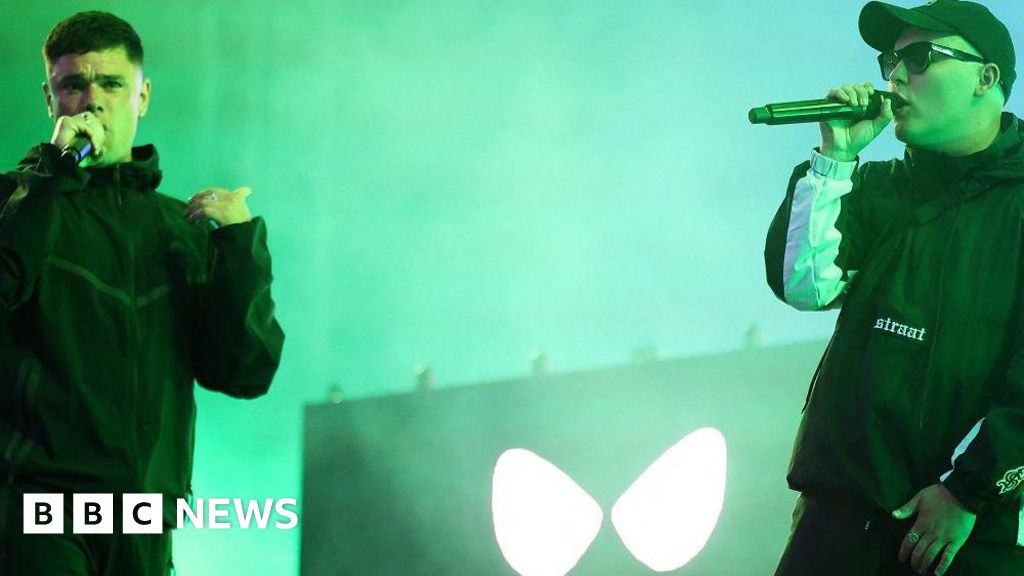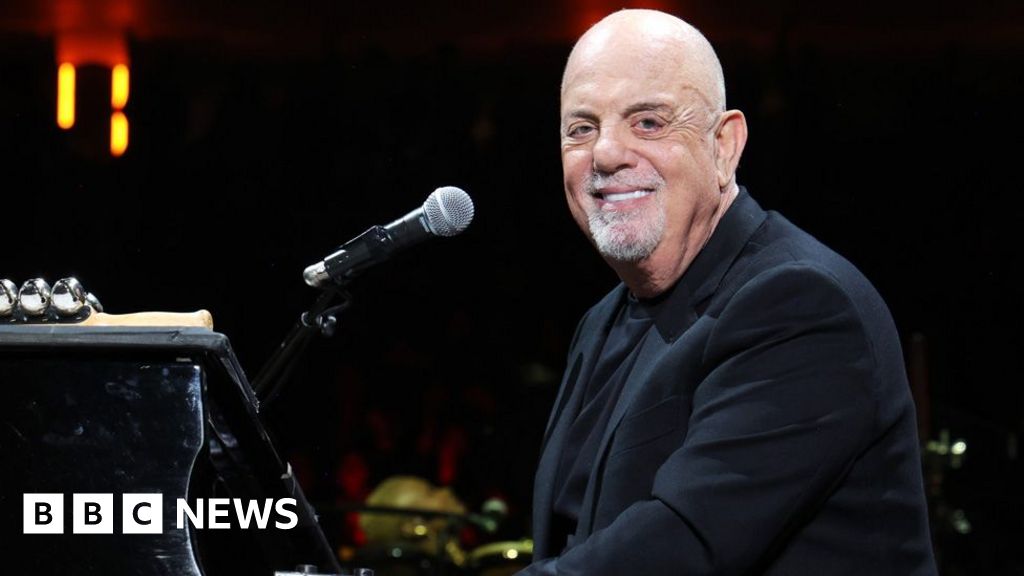ARTICLE AD BOX

Grace Carter: 'It definitely got tough, I'm not gonna lie'
By Mark Savage
BBC Music Correspondent
Here's a tip for any budding songwriters: If you're facing writer's block, text your granddad.
Even if you're not, he might text you some advice anyway. That's what happened to Grace Carter, whose 95-year-old grandfather loves her music so much that he frequently sends her ideas for new lyrics.
In June, she finally set one of his texts to music and filmed his reaction as she played it to him in her car.
"Whoever wrote these words was clever," he grinned, full of familial pride.
He was less impressed, however, when Carter gave him her new EP and his song was missing from the tracklist.
"He was like, 'I don't like it'," she laughs. "But gosh, Don Carter, he's a hero.
"Maybe at some point we'll collaborate on on a whole project: Grace and Don. It could break the internet."
The support of her family has been crucial over the last three years.
Before the pandemic, Carter was on a roll. Her debut single, Silence, went viral thanks to a striking video in which she sang directly to the camera, real tears streaming down her face.
From there, Dua Lipa invited her to go on tour, and she released the heart-wrenching piano ballad Why Her Not Me - all about her absent father, and the discovery he'd been raising another family while keeping her existence a secret.
Vulnerable and melancholy, it resonated with audiences, picking up 47 million streams on Spotify, and earning Carter a place on the BBC's influential Sound Of 2019 list.
Soon, she was off on tour with Lewis Capaldi and Jorja Smith, and shooting adverts for Cartier.
Then Covid struck and all that momentum ground to a halt.
Arriving home from a cancelled tour, she remembers "going into my bathroom and taking my make-up off and just bursting into tears".
But the breakdown was about more than tour dates. In the whirlwind of becoming a pop star, she'd lost sight of who she was.
"I stopped and looked at myself in the mirror and I was like, 'I don't know you anymore.'"
The singer was unable to release music for two years as she extricated herself from a contract with Polydor Records
As a teenager, music had been a way for Carter to process her feelings. She wrote about her dad and her childhood, without realising those stories would become fodder for the press.
"People heard the songs and they were like, 'Oh my gosh, there's this young girl who's singing about heartbreak but, guess what, it's not about a boy, it's about her dad.'
"But, for me, was that was my real life and I was dealing with it every single day as my career was unfolding.
"Then there was a pressure from the industry of: 'You're doing great, we need more, we need more', but the human part of me was saying, 'This is too much for me right now.'"
On top of that, Carter was grappling with another aspect of her childhood, as a mixed race kid with a white single mother. Growing up in London, it didn't seem to matter; but when she moved to Brighton, children at her school asked if she was adopted.
That raised questions of who she was and where she came from that were impossible to answer while her Jamaican father drifted in and out of the picture.
Thrust into the major label music machine, her sense of identity eroded even further.
"People would say, 'You're not this type of artist, you need to be more like that person'. I completely lost myself. I didn't know what I was doing or what was going on."
So while the pandemic seemed like a calamity, the stillness of lockdown gave her space to find perspective.
"I needed to get back to the start, where I was excited about music and writing treatments for videos and in control of everything," she says.
With a deep breath, she severed ties with Polydor records and her management team, and tried to rekindle that spark... but there was still an obstacle to clear.
"My record contract hadn't been terminated, so I was stuck in limbo."
For two years, she was unable to release new music. At one point, she considered giving up altogether.
"I felt like there was a hand over my mouth for a long time [but] I grew up with an incredible mother who was like, 'If you get knocked down, you get back up again and you show 'em what's right.'"
Image source, James Watkins/BBC
Image caption,Grace's music has been championed by BBC Radio 1
The breakthrough came suddenly, and unexpectedly, when Carter was in the studio with London-based producer Tev'n last year.
It was the first time they'd met and, while she's usually shy, something possessed her that afternoon.
"I was like, 'Can you give me the microphone?' - which I never do, and I started singing random noises'.
Tev'n chopped up her improvisations, making a collage of wordless, rhythmical chants. Instead of fleshing out the sound with synths, Carter asked him to sample her voice again, creating a celestial choir.
Ninety minutes later they'd completed her comeback, Pick Your Tears Up.
"It's a song about feeling really depressed, but also a song about looking at myself and saying, 'Okay, you can feel angry but if you hold onto all that negativity, the only person you're punishing is yourself.
"You can either fly, or you can drown in your tears."
The song was an epiphany: A writer rediscovering her voice, through the power of her voice alone.
"Riding the train home, I was back in a place where music was making me smile... I felt free."
This YouTube post cannot be displayed in your browser. Please enable Javascript or try a different browser.View original content on YouTube
The BBC is not responsible for the content of external sites. YouTube content may contain adverts.
Skip youtube video by Grace Carter
Allow YouTube content?
This article contains content provided by Google YouTube. We ask for your permission before anything is loaded, as they may be using cookies and other technologies. You may want to read Google’s cookie policy, external and privacy policy, external before accepting. To view this content choose ‘accept and continue’.
The BBC is not responsible for the content of external sites. YouTube content may contain adverts.
Before long, all of her pent-up feelings spilled onto the page: Her new EP contains songs about her experiences as a mixed-race child (Mother) and the destruction of her self-image (Tired Of Trying To Be Anyone Else).
The powerful, gospel-infused Riot, meanwhile, tackles racial injustice, zoning in on her experiences as a black woman in the UK.
Carter was sent the song by a friend, Fabienne Holloway, in the summer of 2020 as Black Lives Matter protests spread across the globe.
Holloway had originally written it in 2014, about Eric Garner - and Carter immediately saw the parallels to George Floyd and Breonna Taylor, whose deaths spurred the BLM movement.
"It really struck a nerve with me. This song has existed since 2014 and the lyrics are as true now as they were then," she says.
With Nina Simone's quote "an artist's duty is to reflect the times" lodged in her head, she resolved to update the song. But, staying true to her principles, the new lyrics were less about anger than strength and resilience.
"A lot of the time when blackness is spoken about in the media, it's in a negative light, about being a victim or enduring hardships," she explains.
"I didn't want to portray that trauma-driven narrative. I wanted to show real human beings, and the power of black people coming together in joy and community.
"The fact that these people, real people, are being hurt means we need to fight for equality."
The EP, titled A Little Lost, A Little Found, is released independently this Friday. And while Carter's streaming numbers have dipped without the marketing muscle of a record label, it's an obvious step up from a songwriter who's found their footing.
But after her previous experiences, does she worry about opening up to the public again?
"I'm ready to be myself, " she says. "The reason I started making music was to talk about the things I felt and to be very candid about my emotions.
"And although the last few years have been tough, I think I'm equipped to handle anything now."

 1 year ago
143
1 year ago
143








 English (US) ·
English (US) ·